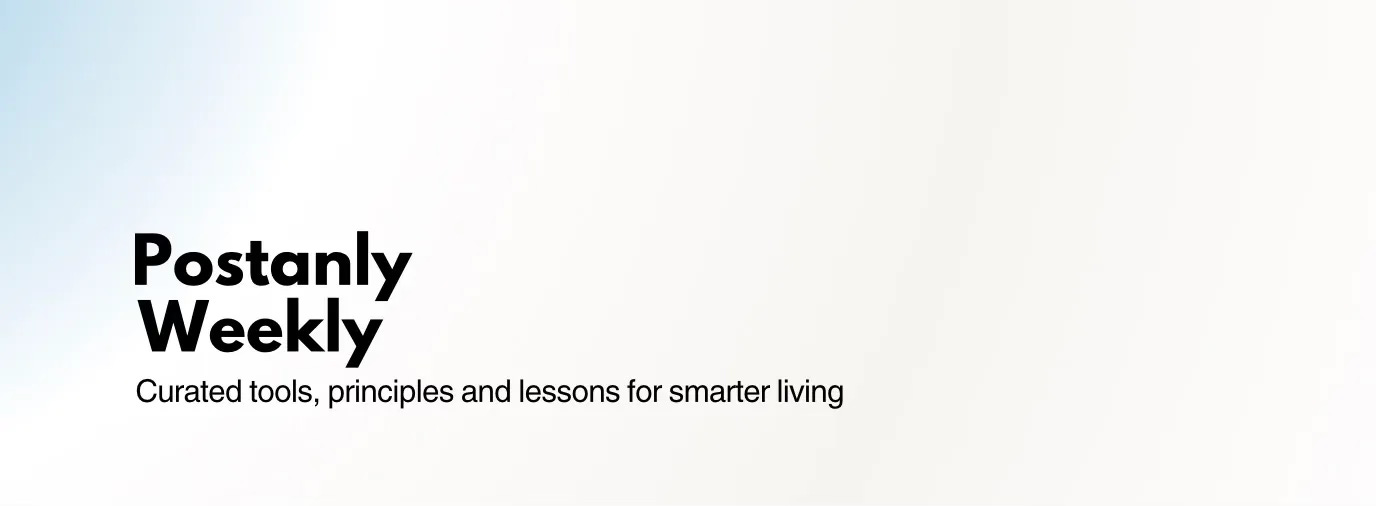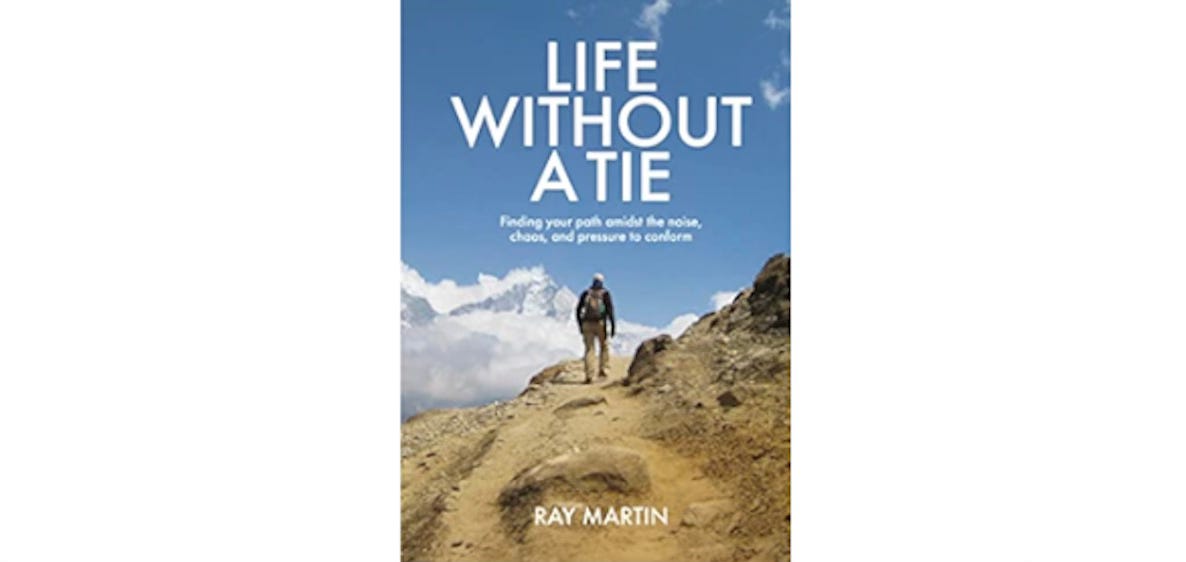Carl Jung: A Jungian Approach to Life
Wisdom in plain sight
Hello everyone,
Postanly Weekly is a reader-supported smarter living newsletter. To support my work, you can upgrade to a paid subscription for $7 per month or $40 for an entire year. With a modest yearly contribution you’re not only helping keep Postanly Weekly going, you also get free access to Thinking Toolbox (mental models for life) and Mental Wealth Toolbox (practical concepts for smarter decisions).
Black Friday Week Discount: Upgrade to support. 50% off today (get free instant access to Thinking Toolbox (mental models for life) and Mental Wealth Toolbox. Use this special link or the button below.
Together with Life Without A Tie, a must read book for anyone at a cross roads in life. An incredibly honest story on the courage to live autonomously and with purpose. How a random, unforeseen series of events helped coach, mentor, facilitator, speaker, writer, and mindfulness teacher Ray Martin strengthen his inner guidance, deepen his humanity, and forge a new, conscious path in life.
This book will fill your heart with courage.
Ray shares a personal story of why there’s more to our experiences on earth than simply birth, school, work, and death. Find out what his six rules for happiness are and how you can author your own so that you can connect to your own heart, inner wisdom and strength. Learn more
Brought to you by MosaLingua
Unlock your potential with MosaLingua’s Black Friday deal: lifetime access to 11 language courses for $99 (97% off). Boost cognitive skills, productivity, and career growth. Embrace lifelong learning.
Offer ends Dec. 2nd at 11:59 p.m. EST.
Carl Jung: How to Live
Psychology study how people think, feel and act — how the mind and body interact. Psychologists try to understand how factors like perception, memory, personality and emotion contribute to health and well-being. Carl Gustav Jung (1875–1961), a psychologist considered one of the founders of modern psychotherapy pioneered analytical psychology, which uses psychoanalysis to understand the human mind.
The analysis uncovers who we really are beneath our conscious thoughts and how we view the world with our five senses. And while most people don’t spend their waking hours thinking about these things, they can have a significant impact on the direction of your life.
He is best known for his theory of the psyche as an interconnected system formed by a combination of the personal unconscious, collective unconscious, and the transcendent self. He also coined the term “synchronicity” to describe coincidences that appear meaningful in hindsight.
Jung’s theories about human consciousness, memory, and identity have profoundly impacted modern thinking about how we think, who we are, and where we’re heading as a species.
His work was focused on the relationship between the unconscious and conscious mind, as well as the role that inner conflicts play in shaping human behaviour.
Jung believed that each person has a “shadow side” hidden from view at times but can be brought to the surface if confronted.
Be mindful of how you interpret any experience
Jung believed that the way we interpret events and situations, consciously or unconsciously, plays a key role in shaping our personalities and behaviours.
“It all depends on how we look at things, and not how they are in themselves,” Jung said. By paying attention to how we respond to events, we can better understand ourselves and our motives for acting in a certain way.
Jung encouraged people to view their environment as an interconnected system with feedback loops that can have far-reaching effects on the outcomes they experience — both positive and negative.
Life is about so much more than what happens to you. It’s about how you respond to experiences, events, and your immediate environment.
So many of us focus on the worst things that have happened to us — bad relationships, failed businesses, losing loved ones, getting fired, nasty break up, etc.
But considering these negative experiences as permanent defining moments in our lives will hold us back from ever moving forward, growing and being happy.
We can do much more if we see life through a different lens and recognise the opportunities for growth or better experiences going forward.
Knowledge of your darkness is the purest form of enlightenment
Consciousness is a process of awakening that happens when you deliberately face your fears, weaknesses, ego and darkness. It can be triggered by an event, a book, a person or anything that shakes you up and makes you see the world through different eyes. Becoming conscious can be extremely painful, but it’s the only way to achieve real personal growth.
The famous psychologist Carl Jung once said, “There is no coming to consciousness without pain. People will do anything, no matter how absurd, in order to avoid facing their own Soul. One does not become enlightened by imagining figures of light, but by making the darkness conscious.”
We cannot escape our darkness; the best thing to do is understand it and learn how to deal with it. You can only begin tackling your fears and insecurities when you know them.
This means facing everything that makes you feel uncomfortable — recognising where your fears come from, why they are there, and what triggers them.
Knowing your darkness means confronting things about yourself that might be painful or frightening to admit. However, once you know your darkness, you can learn to grow past them or design a meaningful life despite your shortcomings.
No matter what we’re working toward, growing pains are inevitable. To reach our peak potential as humans, we must overcome our fears, shatter self-imposed limitations, and resist the urge to take the easy road every time.
A better relationship with your “self” changes everything
“The privilege of a lifetime is to become who you truly are.” — Carl Jung
According to Jung, we all have an innate drive to explore who we are. When we neglect this desire, we feel unfulfilled, empty and hollow. In other words: not finding a place for ourselves in the world makes us feel lost and depressed. “Man cannot stand a meaningless life,” Jung said.
One of the most important life lessons we can learn from the work of Carl Jung is that meaning and purpose are inextricably linked. When we find our purpose, we feel more connected to the world around us and have a greater sense of meaning and purpose.
On the other hand, when we lose our way or feel disconnected from the world around us, it can be tough to find a sense of meaning and purpose in life. Ultimately, it comes down to how we choose to live our lives and what meaning and purpose we can find.
Find a balance between your conscious and unconscious minds
“Until you make the unconscious conscious, it will direct your life, and you will call it fate.” — Carl Jung
Jung’s theories about the unconscious mind and the individual’s relationship to it have become highly influential because they challenge the assumption that humans are essentially rational creatures. They suggest that we are more likely to be ruled by our emotions and instincts.
And while this may seem like a rather pessimistic view of human nature, it is quite optimistic when you look at things in the right light.
After all, it means that we all have the potential to act in ways that are more aligned with our innermost values and motivations. And as such, it provides us with valuable insight into what makes each of us tick.
“Wholeness is not achieved by cutting off a portion of one’s being, but by integration of the contraries,” Jung said.
Wholeness is about finding balance in life, mind, body and spirit. It’s a process of becoming whole again and not just being content with parts of our lives.
It’s a journey to rediscovering who you are, what’s most important to you, what gives your life meaning, and recognising that everything we experience is a learning opportunity on our path to becoming better versions of ourselves. Wholesomeness makes us feel grounded and happy in our own skin. It also brings balance and meaning to our life.
Food for thought
“By three methods we may learn wisdom: First, by reflection, which is noblest; Second, by imitation, which is easiest; and third by experience, which is the bitterest.” Philosopher Confucius said.
I choose bitter.
But there’s so much more beyond Confucius’ third option. Most of what I seek can’t be found; it can only be experienced. When I’m more conscious and notice more, I find hidden wisdom in places I usually ignore. The more I tune in, the more I see. I notice the patterns, the stories, the lessons in almost everything.
A concept worth understanding
Behavioural Inevitability
“History never repeats itself; man always does.” – Voltaire
Historical events may not unfold in identical ways, but human behaviour tends to exhibit certain patterns or tendencies that repeat across different contexts and time periods. Behavioural Inevitability implies that despite the unique circumstances of each era, human nature and the way people respond to various situations tend to remain consistent. People often repeat similar mistakes, make similar choices, and display comparable behaviours throughout history.
For example, while there have been many wars throughout history, each one has its own distinct causes, battles, and consequences. The concept reflects the belief that certain fundamental aspects of human psychology, motivations, and social dynamics persist over time, leading to recurring patterns in human behaviour.
These patterns can manifest in various aspects of society, politics, economics, and interpersonal relationships. The core aspects of human nature, like our self-interest, ambition, fear, and the desire for power, love, and security, are believed to be relatively constant. These fundamental aspects influence how we perceive and respond to events, leading to recurring patterns in behaviours.
We learn, adapt, and evolve over time. That means even "inevitable" tendencies can be shaped and modified through education, social structures, and individual agency.
Dean Yeong’s very short summary of The Simple Path to Wealth
”The simple formula to financial well-being: spend less than you earn—invest the surplus—avoid debt. Your goal is to save up F-You money, generally 25x of your annual expenses, to regain your freedom. During the wealth accumulation stage, allocate 100% of your investment portfolio to Vanguard Total Stock Market Index Fund (VTSAX) or its ETF (VTI). When you're closer to your retirement, adjust 20-50% of your portfolio to include Vanguard Total Bond Market Index Fund (VBTLX) or its ETF (BND). Aim for a 3-7% withdrawal rate during your (early) retirement.”
> My best newsletter recommendations
Have a look at our favourite picks → Topics covered: learning, finance, starting up, productivity, technology, career, better living, seo, venture capital and more.
Explore the complete list of newsletters
An App I’m Enjoying
Meco— Read all your awesome newsletters on a single app. Meco is a distraction-free space for reading and discovering newsletters, separate from the inbox. Add your newsletters in seconds and liberate your inbox.
Move your newsletters to a space built for reading and declutter your inbox in seconds. Enjoy newsletters in a space designed for reading. It’s a time saver for writers and newsletter readers.
Thanks for reading!
Until next week,
Thomas
Medium | All Courses | The Write Life | Philosophy For Modern Life
Postanly Weekly is now a reader-supported publication. To support my work, you can upgrade to a paid subscription for $7 per month or $40 for an entire year. With a modest yearly contribution you’re not only helping keep Postanly Weekly going, you also get free access to Thinking Toolbox (mental models for life) and Mental Wealth Toolbox (practical concepts for smarter decisions).
Black Friday Week Discount: Upgrade to support. 50% off today (get free instant access to Thinking Toolbox (mental models for life) and Mental Wealth Toolbox. Use this special link or the button below.




